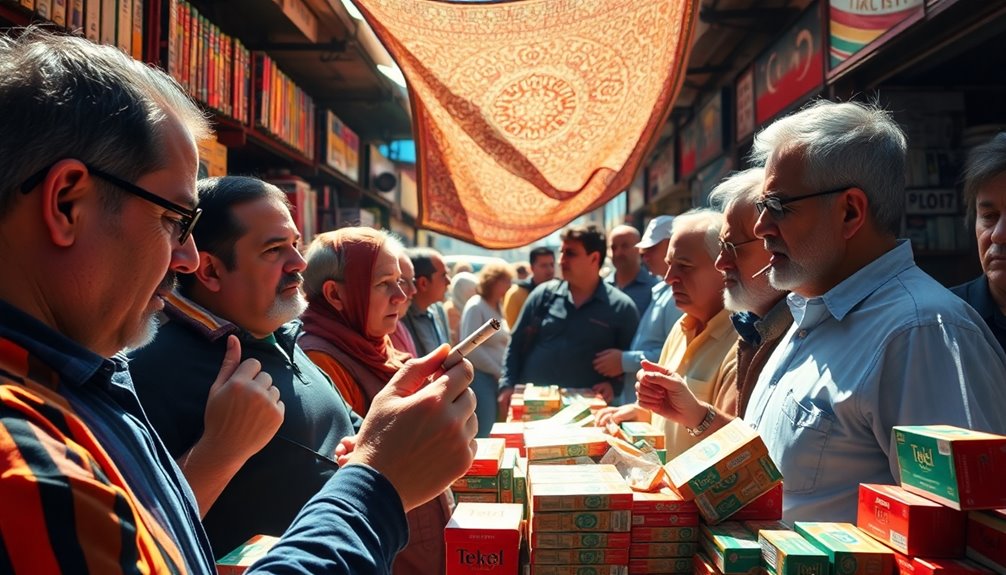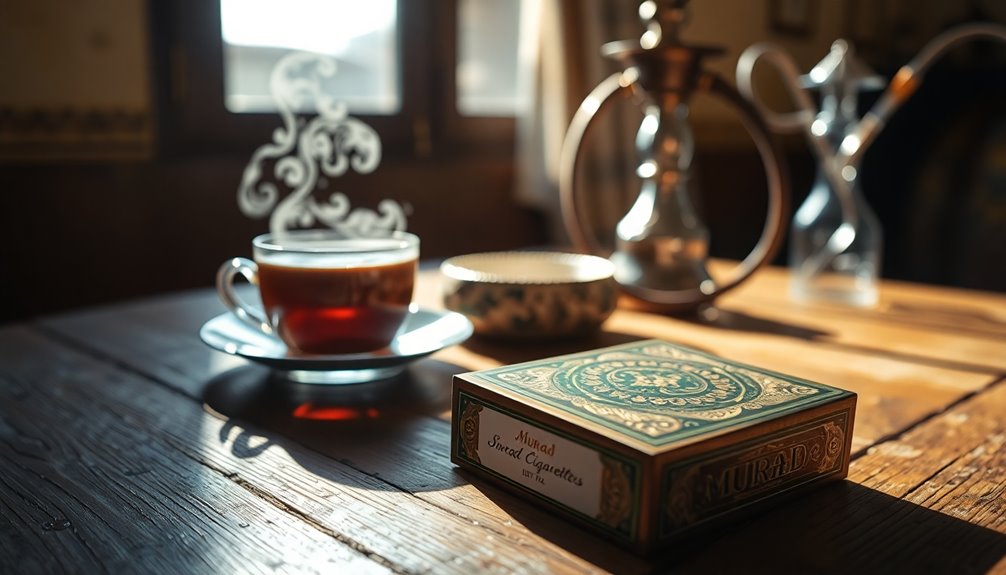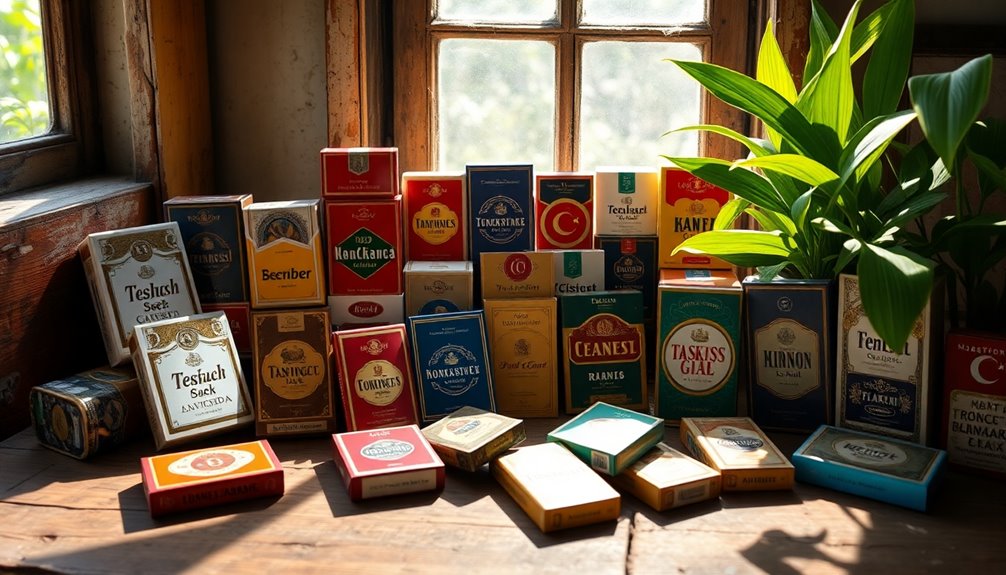If you're curious about Tekel cigarettes and their popularity in Turkey, you'll find they dominate the market, controlling about 72% of it. This brand has deep roots in local culture, appealing to many smokers with its variety and reasonable price. Despite privatization changes, Tekel remains a go-to choice, especially in the oriental segment. Economic factors and smoking rates heavily influence consumer habits, but the brand's legacy persists. As you explore further, you might uncover how these elements come together to shape Tekel's enduring presence in Turkish society.
Key Takeaways
- TEKEL dominates Turkey's cigarette market with a 72% share, making it the leading brand among Turkish smokers.
- The brand's strong presence in the oriental cigarette market, holding 58% share, boosts its popularity among consumers.
- TEKEL's extensive product variety caters to diverse preferences, enhancing its appeal in the domestic market.
- Cultural factors and high smoking prevalence contribute to the sustained popularity of TEKEL cigarettes in Turkey.
- Despite privatization, TEKEL remains a significant player in the Turkish tobacco industry, influencing local livelihoods and employment.
Market Share Overview
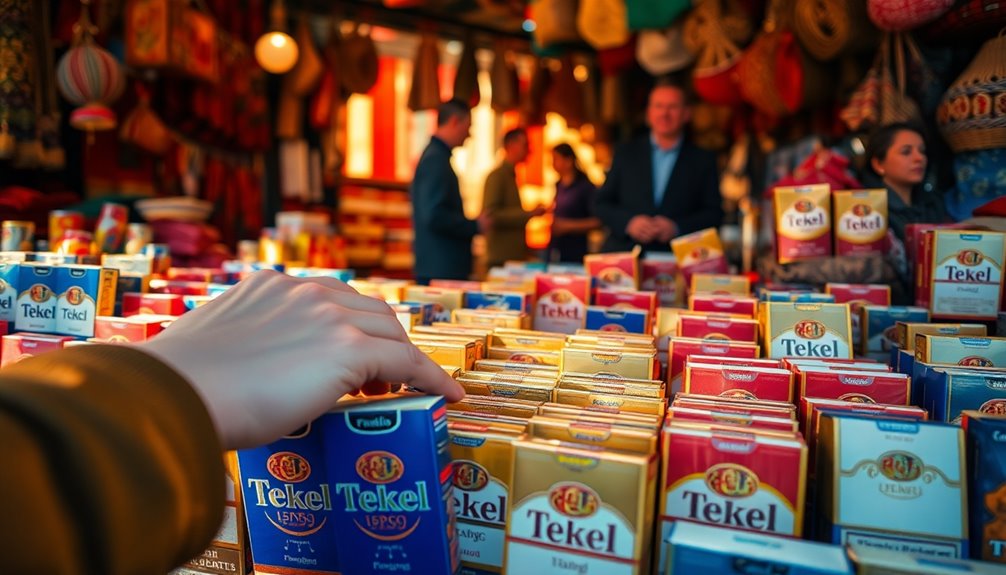
In the competitive landscape of Turkey's cigarette market, TEKEL stands out by controlling about 72% of the total share. You'll notice that TEKEL dominates both the oriental and blended cigarette markets, producing roughly 58% oriental cigarettes and the rest being blended.
Their blended cigarette share is impressive, around 54%, with TEKEL 2000 leading the pack, capturing about 35% of the blended market.
While TEKEL holds a significant lead, it's essential to recognize other competitors, like PM with 23% and RJR with 5% of the market share. The competition remains fierce as manufacturers vie for a larger slice of the growing local market.
You might find it interesting that foreign brand cigarettes, including those produced in Turkey, have surged, skyrocketing from virtually nothing to a 32% market share from 1990 to 2000.
Consumer preferences are shifting too, with a marked inclination towards American blend cigarettes, now accounting for 85% of the market. Additionally, it's noteworthy that Turkey accounts for 4% of global tobacco production, reflecting its significance in the international tobacco landscape.
As you explore the dynamics, you'll see how TEKEL's stronghold is challenged, reflecting changing tastes and economic factors that shape this vibrant market.
Production Capacity Insights
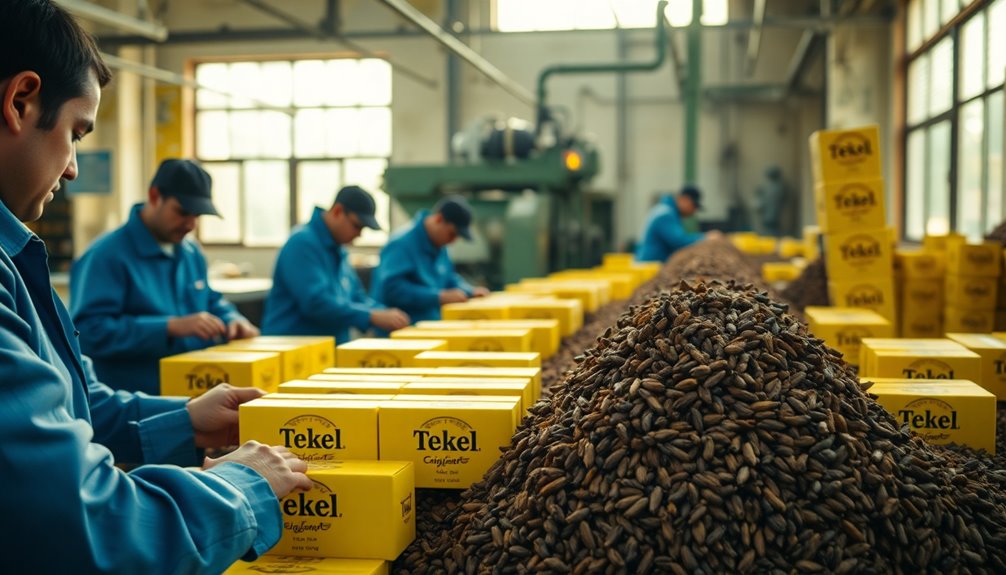
Navigating the evolving landscape of Turkey's cigarette production reveals significant insights into capacity and regulation. The new law mandates that any new cigarette factories must have the capacity to produce at least two billion pieces annually. This shift has led to the separation of TEKEL's manufacturing and leaf tobacco buying sections.
Since the abolishment of TEKEL's monopoly in 2002, private firms like British American Tobacco (BAT) have entered the market, with BAT's new facility in Tire, Izmir, starting at two billion pieces and aiming for ten billion.
Currently, major players have impressive capacities: Phillip Morris produces about 30 billion pieces annually, while Japan Tobacco International (JTI) follows closely with 28 billion. TEKEL's production capacity has stagnated due to its impending privatization. This situation is compounded by Turkey's recognition as the largest producer of aromatic Oriental tobacco, solidifying its role in the global market.
The regional dynamics are also noteworthy, with the Aegean region leading in oriental tobacco production. Technological advancements are transforming the industry, with the adoption of modern drying methods and efficient processing systems.
Export Trends and Challenges

Turkey's cigarette export market has shown substantial growth, with the country becoming the 11th largest exporter of cigarettes containing tobacco globally in 2022. The export value reached $494 million, positioning cigarettes as the 111th most exported product in Turkey.
Iraq remains the largest market, with exports valued at $75.8 million, while Georgia, the UAE, Kuwait, and the U.S. also play significant roles. Despite this growth, challenges exist. Economic downturns in key export markets, like Russia, can negatively impact demand, leading to declines in exports. For instance, fluctuations in demand and high export prices caused a significant drop in 1998.
As you analyze these trends, it's essential to recognize the competitive landscape. While TEKEL controls around 72% of the Turkish market, the government monopoly multinationals like PM and RJR are pushing to increase their share through joint ventures and expanded production.
Additionally, government regulations on production quotas and pricing can complicate export strategies. Staying informed about both market opportunities and challenges will be vital for understanding the future of Turkey's cigarette exports.
Popular Product Types

The growth of Turkey's cigarette export market reflects not just the demand but also the variety of products available, which cater to different consumer preferences.
When you explore Tekel's offerings, you'll find popular brands like Tekel 2000 and Tekel 2001, both American blend cigarettes that appeal to those who enjoy a classic taste. If you're looking for something more local, Meltem and its variant Meltem 100's showcase the Turkish tobacco flavors that many prefer.
For those who enjoy longer cigarettes, the Tekel 2000 Uzun Kirmizi provides an extended smoking experience, produced under the Tekel brand by British American Tobacco. Interestingly, the popularity of e-cigarettes among youth in the U.S. has significantly shifted traditional smoking habits, indicating changing preferences in tobacco consumption.
With Tekel holding a 70% share of Turkey's domestic market, it's clear that their product variety significantly influences consumer choices.
Moreover, Tekel's commitment to quality is evident in their research and development efforts, ensuring that they meet the diverse tastes and nicotine preferences of Turkish smokers.
As you consider your options, Tekel's range reflects both traditional and modern preferences, making it a staple in the Turkish tobacco landscape.
Economic Factors Influencing Sales
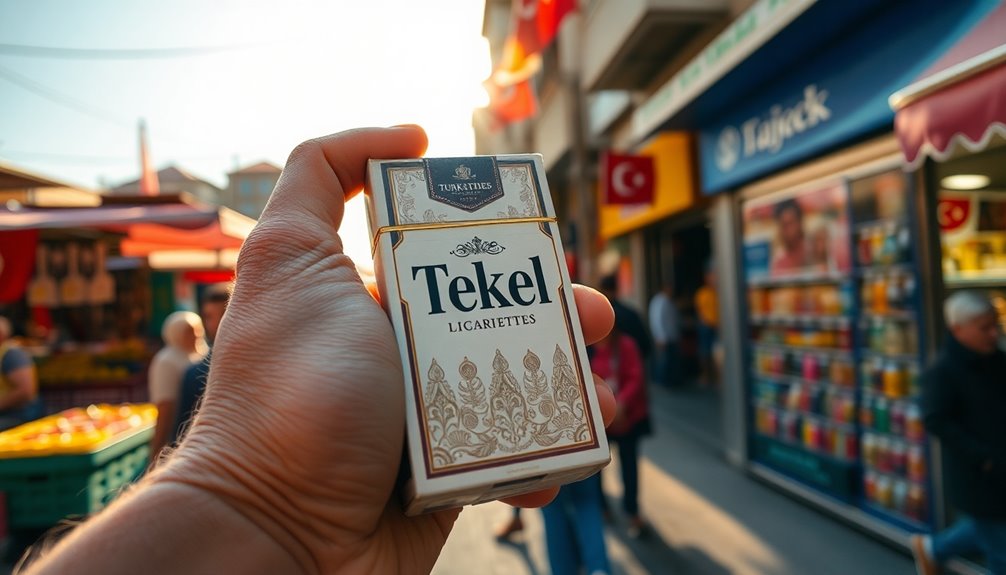
While examining the economic factors influencing cigarette sales, it's clear that taxation plays a crucial role. In Turkey, cigarette taxes contribute about 6% to government revenues, although this share is declining as the economy diversifies. Higher tobacco taxes can reduce consumption, but they aren't a standalone solution. The Tobacco and Alcohol Market Regulatory Authority (TAPDK) oversees these taxes, and regular adjustments to specific excise taxes help gauge their effectiveness.
Consumer affordability has risen due to steady economic growth, making cigarettes relatively cheaper compared to inflation. This encourages demand, especially among wealthier populations. However, while higher prices may not significantly impact overall smoking rates, they do affect consumption levels, particularly for lower-income smokers who might quit or reduce usage. Notably, the annual economic cost attributed to smoking and tobacco use in Turkey is a staggering 85,332 million Turkish liras, highlighting the financial burden on families.
On the employment front, cigarette production employs only 0.13% of Turkey's workforce, and most tobacco farmers grow minimal quantities. The privatization of TEKEL in 2008 led to a decline in local tobacco farming, as multinational companies took over.
Thus, while economic factors influence sales, they also intertwine with broader health implications and societal costs, highlighting the complex dynamics of the tobacco market in Turkey.
Turkey's Regional Tobacco Significance
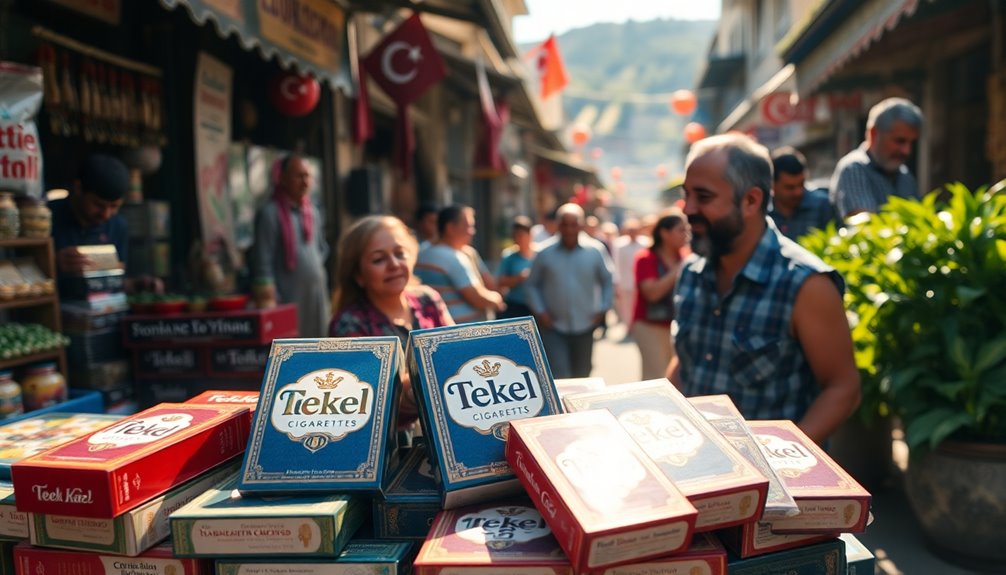
Located at the crossroads of Europe and Asia, Turkey plays a significant role in the global tobacco market. As the world's 10th largest tobacco producer, Turkey accounts for 1.2% of the global market, with a staggering 65% of Oriental tobacco production originating here.
You'll find that tobacco cultivation primarily thrives in hilly terrains, with less than 1% of the country's cultivated land dedicated to this crop.
Despite a decline in the number of tobacco farmers—from 160,000 in 2002 to just 56,000 in 2015—Turkey remains a vital player in tobacco trade, exporting around 55% of its production. Major importers of Turkish tobacco include countries like the United States, Canada, and Germany.
While Oriental tobacco is sun-cured, Virginia and Burley types are less common, making up less than 3% of the total production.
Turkey's high smoking rates, combined with stringent tobacco control measures, highlight the complex relationship between regional cultivation and consumption.
As you explore Turkey's tobacco significance, consider how these dynamics shape both local livelihoods and global trade.
Frequently Asked Questions
What Are the Health Impacts of Smoking Tekel Cigarettes?
Smoking Tekel cigarettes significantly harms your health.
You face increased risks of various cancers, including lung and oral cancers, as well as serious cardiovascular and respiratory diseases like heart attacks and COPD.
The damage doesn't stop there; it also affects your skin, teeth, and overall fertility.
If you're pregnant, smoking can lead to severe complications for both you and your baby.
Quitting now can dramatically reduce these risks and improve your health.
How Does TEKEL Ensure Quality Control in Its Products?
TEKEL ensures quality control in its products through a multi-stage inspection process.
You'll notice that each cigarette undergoes checks at various stages, from leaf inspection to final product evaluation. Workers actively supervise blending and manufacturing, maintaining consistency and quality.
They also focus on moisture control and automated production methods, ensuring optimal conditions.
Government regulations further support quality by implementing production controls and providing subsidies, enhancing the overall standard of TEKEL's tobacco products.
What Marketing Strategies Does TEKEL Use to Attract Consumers?
To attract consumers, you'll notice Tekel uses a mix of indirect advertising and strategic pricing.
They often refresh display racks in retail stores, despite advertising bans, which keeps their products visible.
Implementing targeted marketing for different income segments helps them connect with a diverse audience.
Additionally, they employ pricing strategies, like discounts and promotions, making their products more appealing, especially to younger smokers looking for affordable options.
Are There Any Specific Demographics That Prefer Tekel Cigarettes?
When considering the demographics that prefer certain cigarette brands, you'll find that TEKEL attracts a diverse group.
Primarily, adult men aged 25-45 often gravitate towards their products, drawn by brand loyalty and familiarity.
Younger smokers, particularly teens and young adults, may also show interest due to affordability.
However, factors like income level and regional differences can influence preferences, making it essential to understand the broader market trends affecting these demographics.
What Innovations Is TEKEL Pursuing in Cigarette Production?
You'll find that Tekel is pursuing several innovations in cigarette production.
They're adopting new drying methods, utilizing technology to enhance efficiency, and shifting towards contract farming to meet market demands.
By focusing on quality improvement research, Tekel aims to boost productivity and operational efficiency.
These advancements not only refine their processes but also align with the growing emphasis on sustainability within the tobacco industry, ensuring they remain competitive in a changing market.
Conclusion
In conclusion, tekel cigarettes have carved out a significant niche in Turkey's tobacco market, thanks to their unique production and popular product range. Despite facing export challenges, their appeal continues to thrive, driven by local preferences and economic factors. As Turkey remains a key player in the regional tobacco landscape, tekel cigarettes are likely to maintain their popularity. Understanding these dynamics can help you appreciate the brand's enduring presence and influence in the market.
